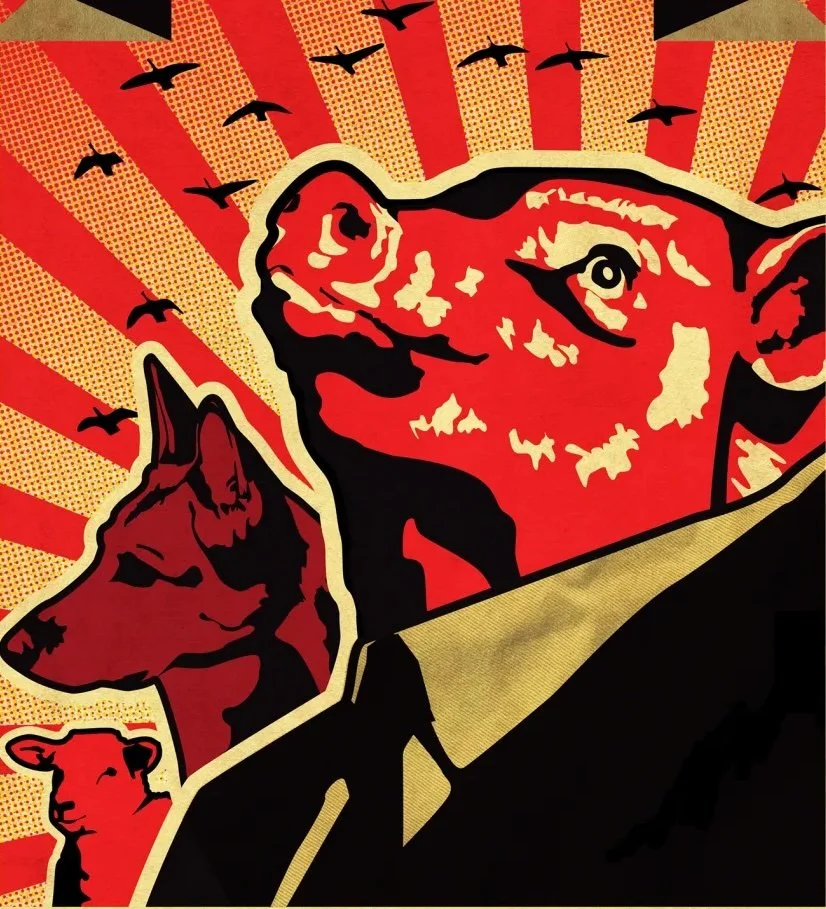Logic and reason are being ushered out of the room. What’s left is a growing fog of how beliefs and values are expressed and especially the language that is used. Once upon a time logic and reason cleared any foggy notion that came up in conversation, but we are now seemingly left to the unquestionable imbeciles that lack rational thought. These self-regulating halfwits emerge in the room replacing logic and reason like a tribe of Oompa Loompa’s from Willy Woke’s Chocolate Factory.1 And they don’t just emerge, they come with woeful virtue signaling.
Read MoreIn his allegorical story called Animal Farm, George Orwell writes, “All animals are equal, but some are more equal than others.”1 The animals on a particular farm were rebelling against the concept that humans did not distribute resource, opportunity, and privilege equally. In pursuit of Comrade Napoleon’s vision of an egalitarian world – where all animals can be equal – the livestock passionately rebel against the human power structure.
Read MoreI’m going to take you from the sublime to the ridiculous in this blog, and I’m going to sincerely be an advocate for women’s rights, or more specifically, women’s rights in competitive sports.
So, let’s begin with the sublime by quoting the founder of the Olympic Games Committee from 120 years ago. “The Olympic Games were created for the solemn and periodic exaltation of male athleticism with female applause as reward.”1 French aristocrat Baron Pierre de Coubertin made this seemingly misogynous comment adding, “as no women participated in the Ancient Games, there obviously was to be no place for them in the modern ones.”2
Read MoreWe use “lovely” too casually. We say it about a garden, a painting, a wedding dress. But when David writes, “How lovely is your dwelling place,” he’s not talking about aesthetics. He’s talking about loveliness that stirs the soul — beauty that heals, holiness that attracts.
Read MoreLooking at the practice of Halloween by Christianity today, it has been said that it has "less to do with heresy than with syncretism – the mixing of different beliefs and practices in ways that distort the truth and power of the gospel"
Read MoreFrustration, profound frustration. We’ve all been there, perhaps you are there right now. Before depression became known as ‘depression’ in our mental state, Peter sat with his friends on the shores of Galilee thoroughly depressed. His response, “I’m going out to fish.” Nothing wrong with a good day’s work to combat depression, unless you knew better.
Read MoreThe problem in linguistics is not just one of language but also of generations. Words stay the same, but their meaning changes fast. For example, I have a publication in my library called Fagots on the Fire. The word “gay” is use throughout, but it meant a disposition of happiness not an orientation. When the Thomas Oliphant wrote the Christmas song Deck the Halls with Boughs of Holly the third line reads, “Don we now our gay apparel”. Oliphant did not mean we do Christmas in drag, rather, wear colorful clothing. Hence, the problem of communication is not only one of language but generations.
Read MoreI’d never seen it before, and it does not compare to God Save Our Gracious King in Britain. It was September 1999. I had been granted a visa to relocate my family from Britain to America. One month in, I was captured by baseball spectators representing both teams standing with their hand – and in many cases a baseball cap – covering their heart and singing the Star-Spangled Banner
Read More“A new man is arising…and yet I am sorry to lose God!”
Who said this, who is the new man, and why does it matter?
Read MoreA man once asked, “Who is this that appears like the dawn, fair as the moon, bright as the sun, majestic as the stars in procession?” His name was Solomon, the third king of Israel. Despite having 700 wives and 300 concubines, he appears to search for an alluding answer. Perhaps the first woman to walk the earth can help us in searching for an answer.
Read MoreOpening his eyes after a deep sleep, Adam’s gaze was fixed upon the most alluring figure. In that moment he announces, “She shall be called woman”. Adam’s identifying announcement is either a matter of orthodoxy, myth, or something else. If orthodoxy, his words bring a great deal to the table in identifying a woman and questions of how he knew. If myth, his words can be read as mansplaining by not giving Eve the opportunity to identify herself, “My name is Eve, I am a woman and I go by the pronouns she and her."
Read MoreWe’ve all read tales of hope or despair.
You may have read classic stories like David Copperfield (Dickens), Tom Jones (Fielding) or Les Misérables (Hugo). If you have, I guarantee your imagination latched on to a growing theme of hope as you turned each page.
How do I know? It’s what the author intended you to experience. Victor Hugo said of his novel Les Misérables, “So long as ignorance and poverty exist on earth, books of this nature cannot fail to be of use.” The story of Jean Valjean has brought hope to many as a tale of redemption!
Read MoreWhy are college students becoming dumber in America? Perhaps Orson Wells was correct predicting that colleges would one day teach anything, including a degree in mud pies. The answer is well-documented: long-term decline in IQ scores, verbal competence, the ability to emotionally cope, social skills, and overall maturity are diminishing. But it was not always this way.
Read MoreRemember wearing masks?
The inconvenience of it all, and in hindsight, the debunked reasons for wearing a mask in the first place. Preventative for sure, but with no guarantee. Every State, City, and School District seemed to have a different set of rules for the same virus. Though we toed the line, I don’t think the virus was listening.
And listening is something that requires you to take the mask off, not from your face but from your mind and heart.
Read MoreSelf-help books are an oxymoron…because they are written by someone else! I’m not opposed to self-help books, but considering the industry is currently valued at $44 billion it does give pause for thought that people are searching for something clarifying about themselves. Choices on the bookshelf are as varied as Baskin Robbins selection of 1,400 ice-cream flavors (originally 31); and the methods of self-help are just as numerous.
Read MoreJoy, in the biblical sense, is a choice. It’s not something that happens to you. It happens within you. St. James wrote that we are to “count it pure joy” whenever we face challenging times. If we are to espouse joy in difficult seasons of life, why does there seem to be a lack of intentionally embracing this heartening experience?
Read MoreConflict of faith and doubt are a necessary irritation to the soul. The irritation presents itself as an unavoidable chafing to the soul when we pray. As such, we are haunted by the words, “I do believe; help me overcome my unbelief” (Mark 9:24). But dare we admit it? If we do, the result of doubt aggravating faith quite often forms the most beautiful pearl of possibilities, in that, “Everything is possible for one who believes” (Mark 9:23). In the waiting room between the ascension of Christ and His return, we face moments of crisis where doubt unwantedly rubs against our faith. Embrace it.
Read MoreThere are many recorded accounts that could be called “almost-drowned”[1] where vivid experiences are explicitly shared. They involve consciousness, lungs burning like hot lava, brutality where everything goes black, sheer panic, and shock. Neurologists and phycologists point out these terrifying sensations inform us we are still alive, albeit for a few moments.
Read More“It’s a boy!”, said the doctor.
Two years later he said the same thing when my second child was born, “It’s a boy!”
Three years later the midwife announced something I was hoping for, “It’s a girl!”
The doctor and midwife were not assigning a gender as each of my three children made their debut in the world. What they did was count their fingers and toes, tested their eyes and ears, measured their weight and length, listened to their heart, maneuvered their joints, and noted their genitalia.
Read MoreIn this blog, I want to build on that foundation by looking at four conditions that shed further light on this elemental understanding of human identity: chaos, order, non-order, and disorder. Recognizing these conditions, albeit briefly, will help navigate our thinking through what seems to be an idolatry of identity today. So, let’s begin at the beginning.
Read More


















